Head of Culture
Faculty of Arts, Science and Technology

History BA (Hons)
- Home
- Courses by subject
- History BA (Hons)
Key Facts
-
UCAS Code
BA: V100
BA with Foundation: V102 -
Level
UndergraduateUG BA (Hons)
-
Duration
Full Time: 3 years
Full Time Foundation: 4 years
Part Time: 4 - 6 years -
Starting
September
-
BCC at A Level or,
DMM at BTEC -
Full Time: £9,535
Part Time: £1,585 (per 20 credits)
Integrated Foundation Year: £5,760 -
Full Time: £15,700
Integrated Foundation Year: £15,700 -
Waterside
Updated 27/03/2025
Updated 27/03/2025
Get in touch
For questions regarding study and admissions please contact us:
UK STUDENTS ENQUIRIES
study@northampton.ac.uk
0300 303 2772
INTERNATIONAL STUDENTS ENQUIRIES
Studying BA History at the University of Northampton will allow you to gain an excellent understanding of how historical events have shaped the contemporary world, as well as to develop key skills which are valued by diverse employers.
Our History BA degree is delivered by a friendly group of deeply knowledgeable staff whose expertise encompasses the history of politics, warfare, society, culture, economics, religion, class, age, race, medicine, crime, gender, emotions and sexualities. Students study the distant and recent past, local communities and global networks, learning how to compare societies across time and space, but also how to engage critically with evidence and the arguments of other historians. UON History BA graduates emerge from their studies as intellectually enriched individuals who pursue interesting and rewarding careers.
Highlights
- Study the histories of Britain, Europe, the USA and global empires from the Middle Ages through the Early Modern period up to the 21st Century.
- Choose from modules on political, social, cultural and economic history which focus on class, gender, race, crime, medicine and emotions.
- Undertake a heritage-focused project with a professional client to develop skills in digital literacy and critical thinking which employers value highly.
- Engage directly with historical texts, images and objects to produce your own piece of original research on a topic of your choosing.
- Work with staff on the History BA degree whose research and teaching demonstrates why knowledge of the past is vital to understanding the contemporary world.
- Access close to hand collections in the unique Searchlight Archive, the Northampton Record Office, and the National Museum of Leathercraft.
- Follow us on X at @HistoriansUON or visit our blog site for more updates from the History team at UON.
- Guaranteed paid internship with the Northampton Employment Promise.
- HP laptop and software included with this course for eligible BA History students* (*see Eligibility criteria and Terms and Conditions)
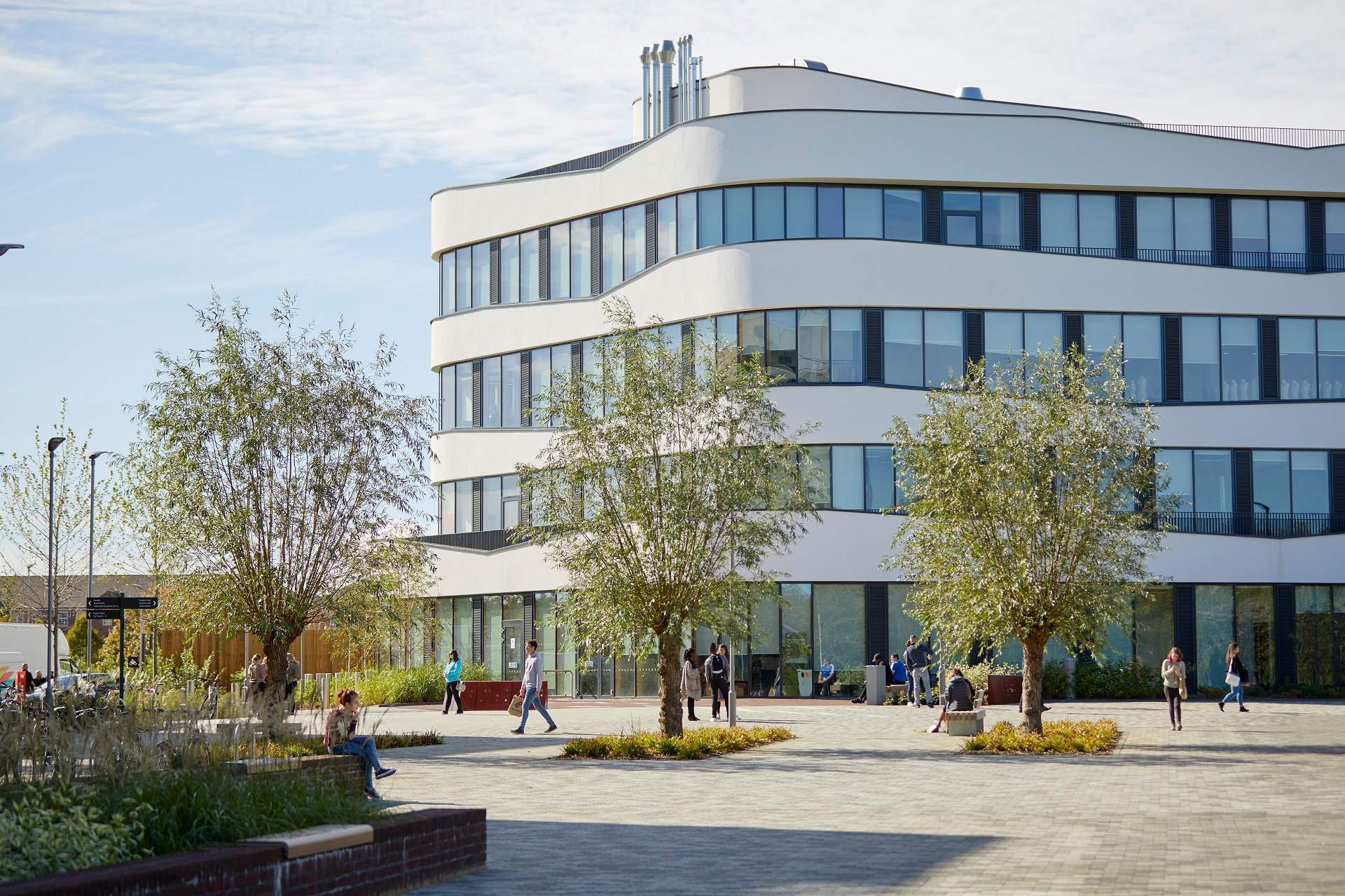
Image shows external view of the Creative Hub, which is a large modern multi-story building with curved design, large windows, and white façade. In front of the building, people walk and sit on a landscaped plaza with trees and benches.
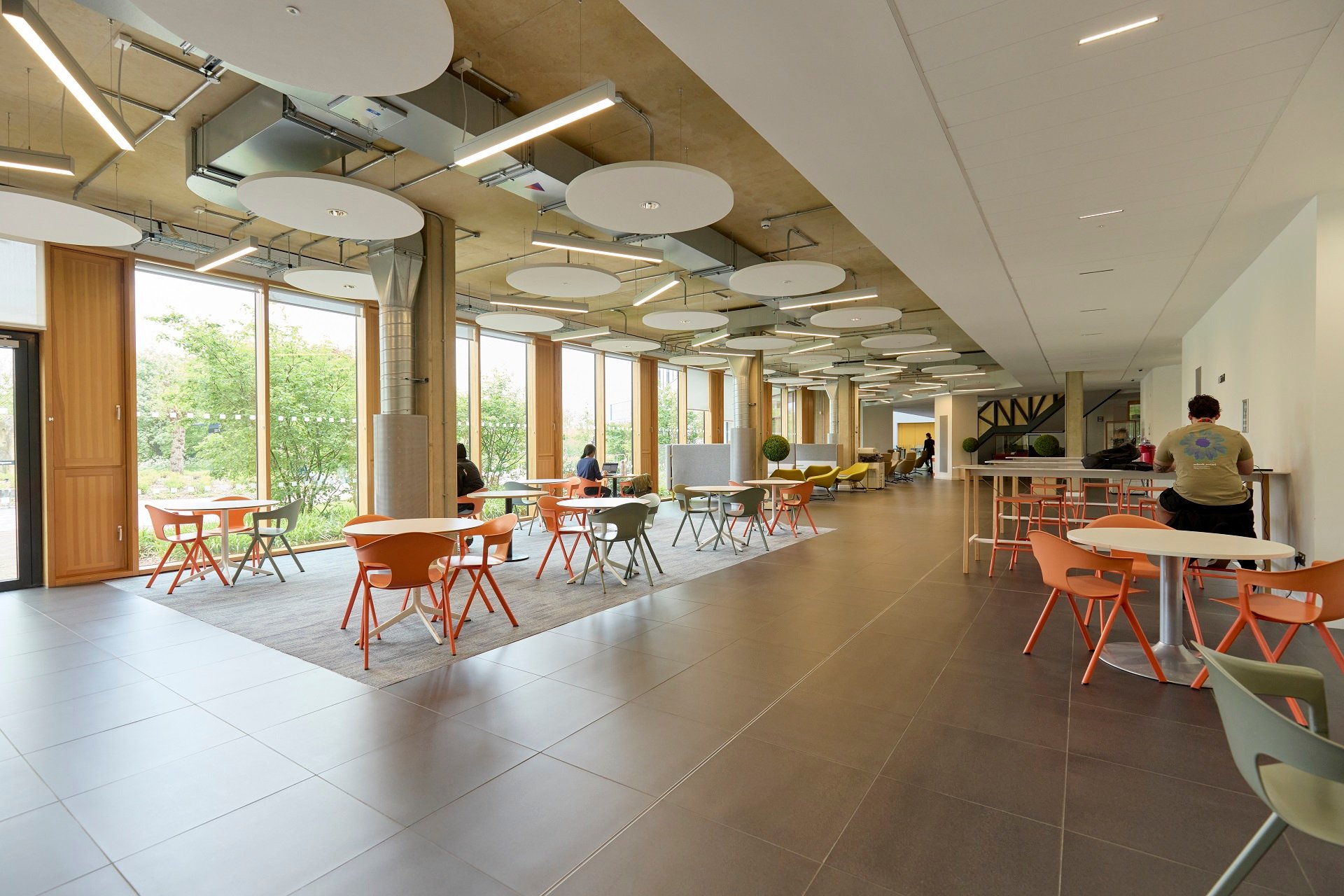
Image shows a study area on the ground floor of the Creative Hub; it has bright and modern with large windows, light fixtures on the ceiling, colourful chairs, and students seated at tables.
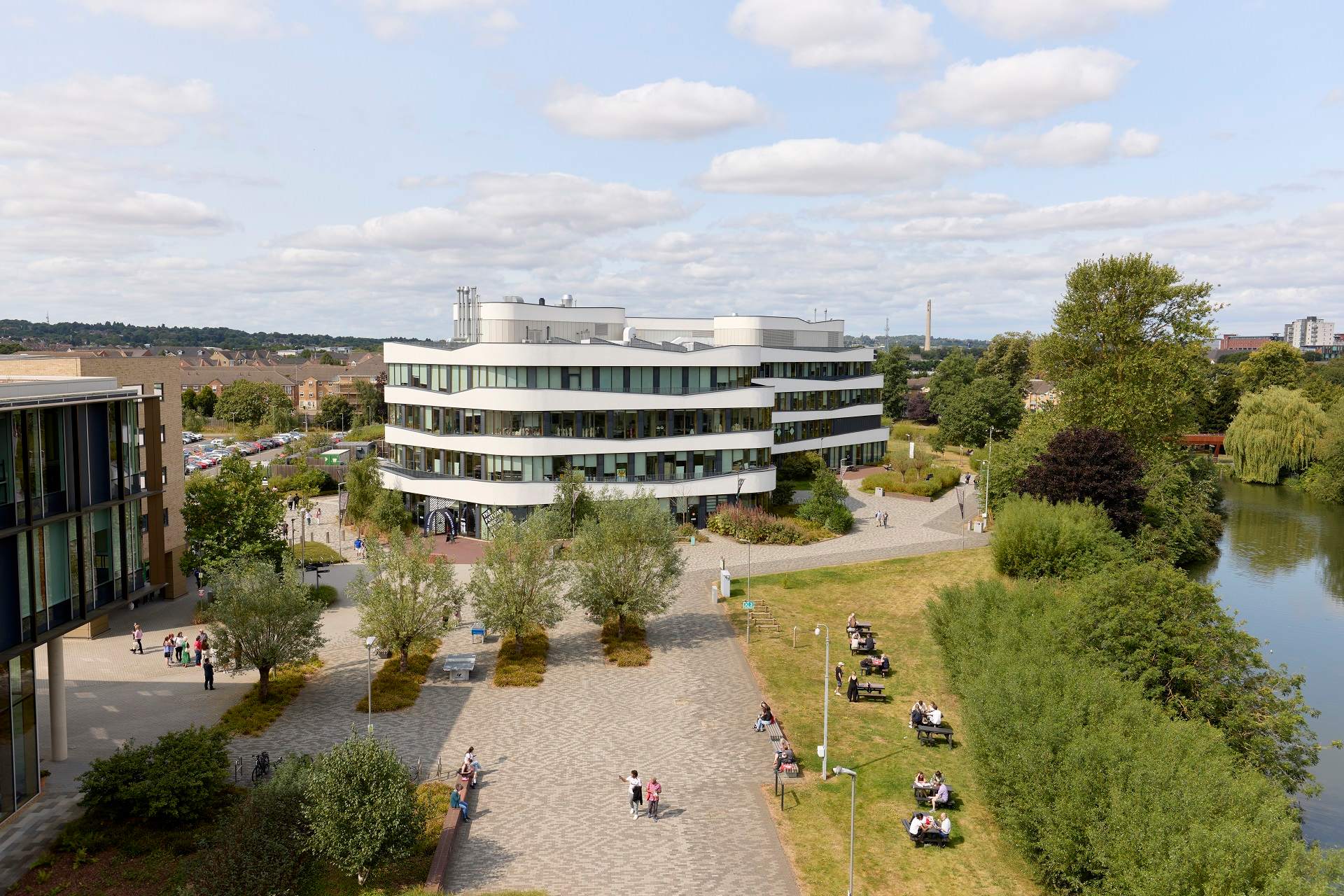
Image shows aerial view of the Creative Hub; a modern, curved building surrounded by greenery, paths, and people sitting or walking near a river on a partly cloudy day.
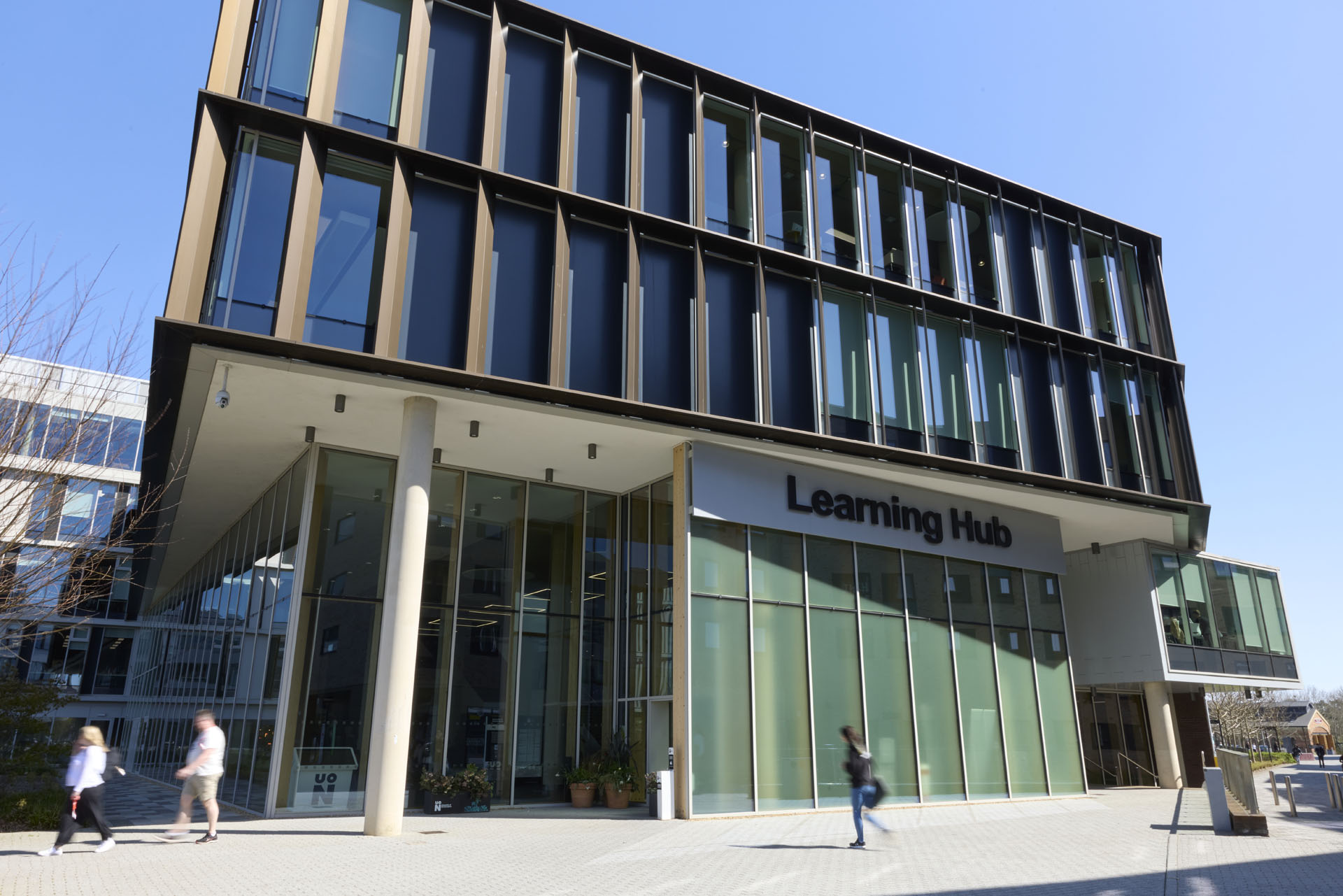
Image shows the main entrance to the Learning Hub, which is a large, multi-storied building with many large windows, with ‘Learning Hub’ in large letters on the front. It is a sunny day, and several blurred people are walking outside.
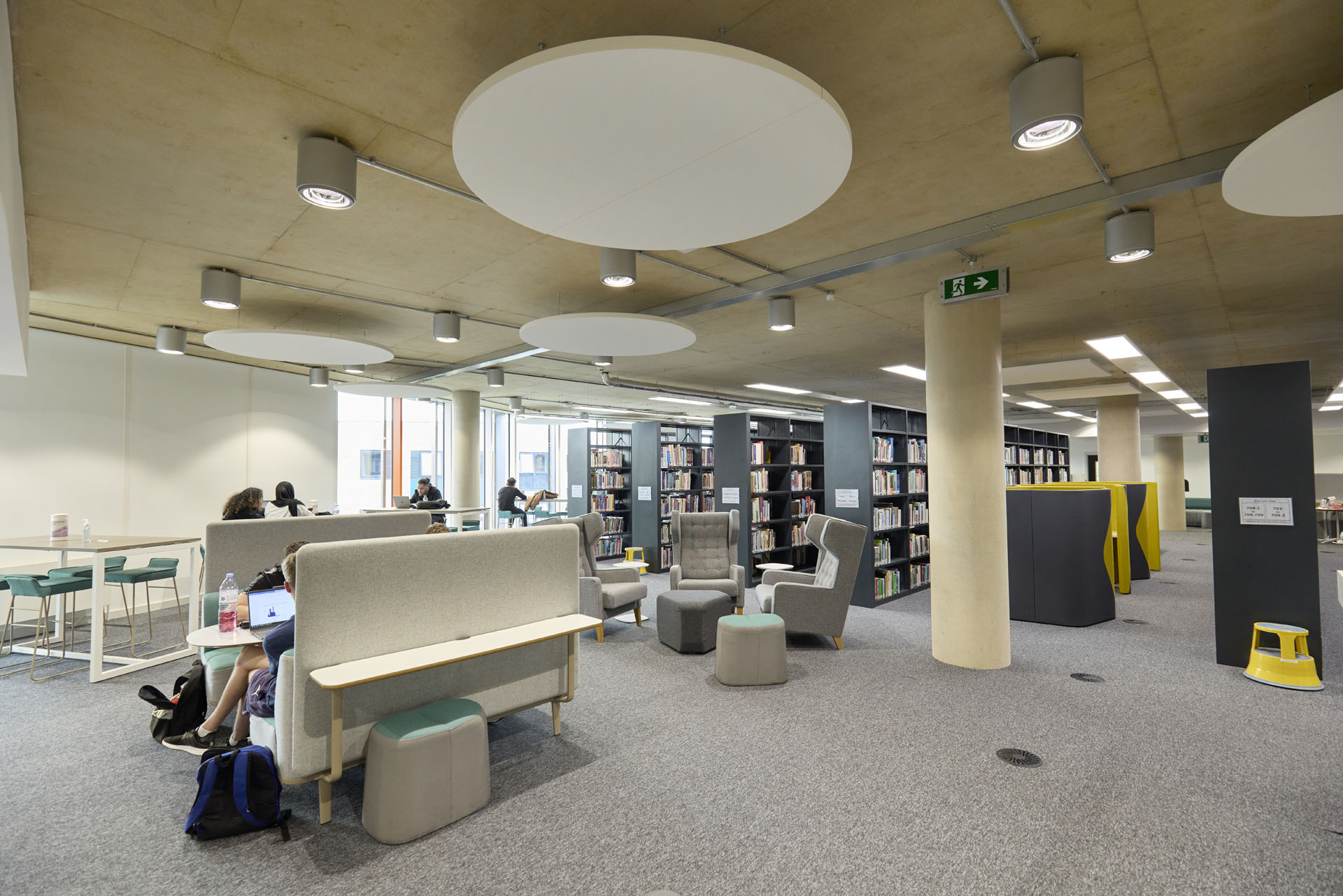
Image shows a modern library interior with people reading at tables and seated on cushioned chairs in the Learning hub. Shelves filled with books are visible in the background under circular ceiling lights.
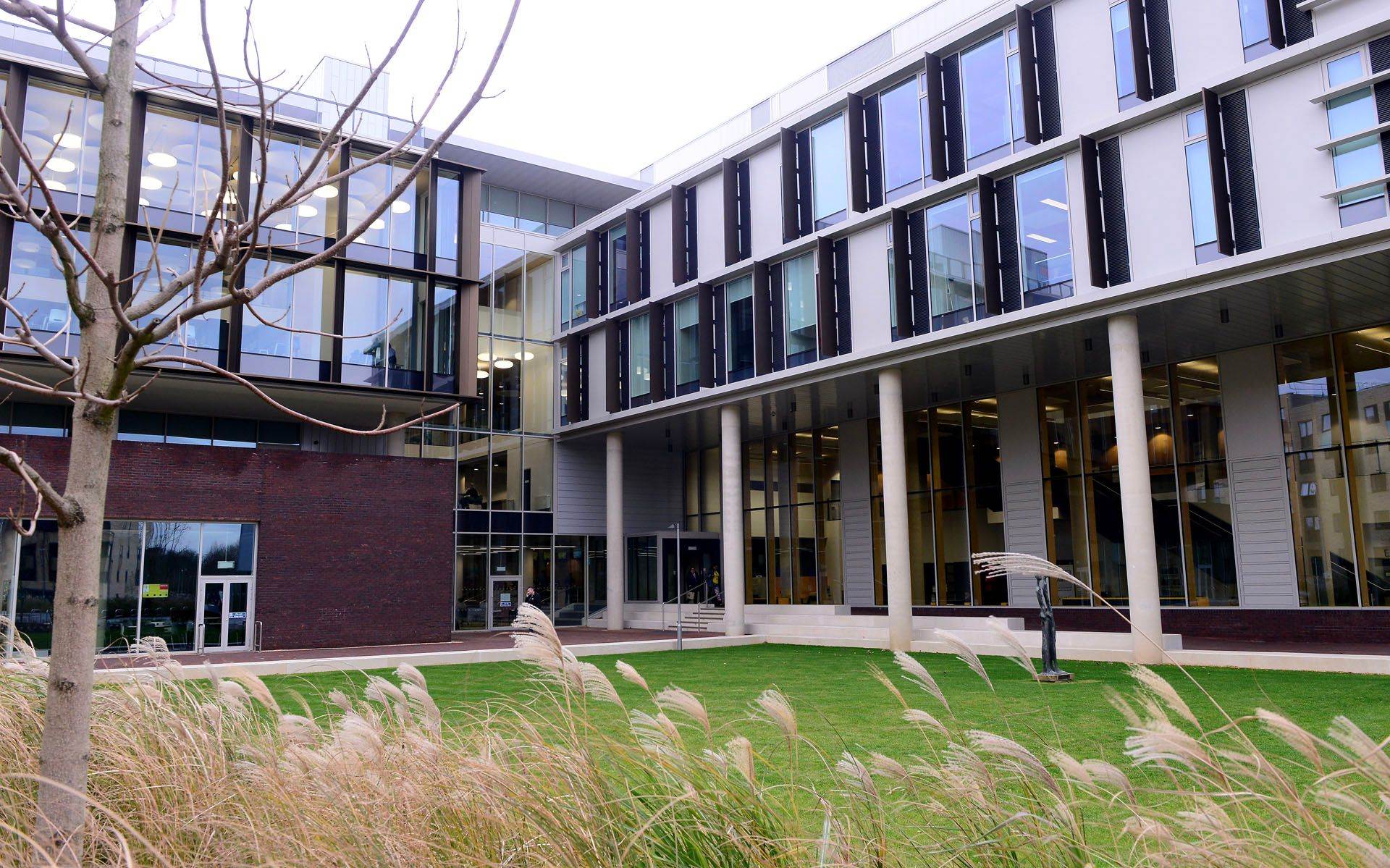
Image shows view of the lawn and courtyard outside the Learning Hub, featuring a bare tree, ornamental grasses, and an abstract sculpture. The building has several stories and features large windows.
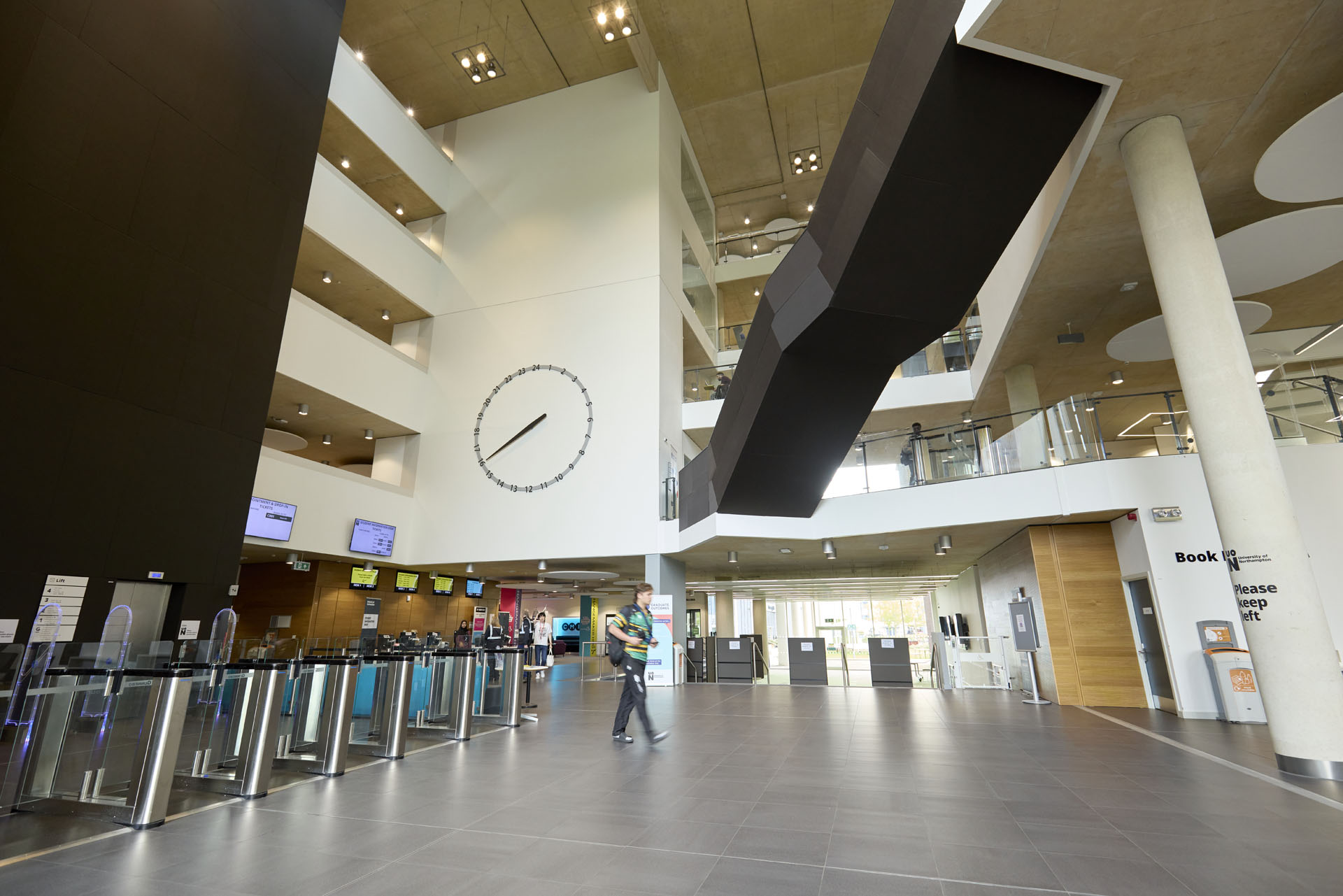
Image shows the ground floor of the Learning Hub; it is a large, modern atrium with high ceilings, a large clock on the wall, turnstile gates, and an angular black staircase. A student carrying a backpack is walking through the space.
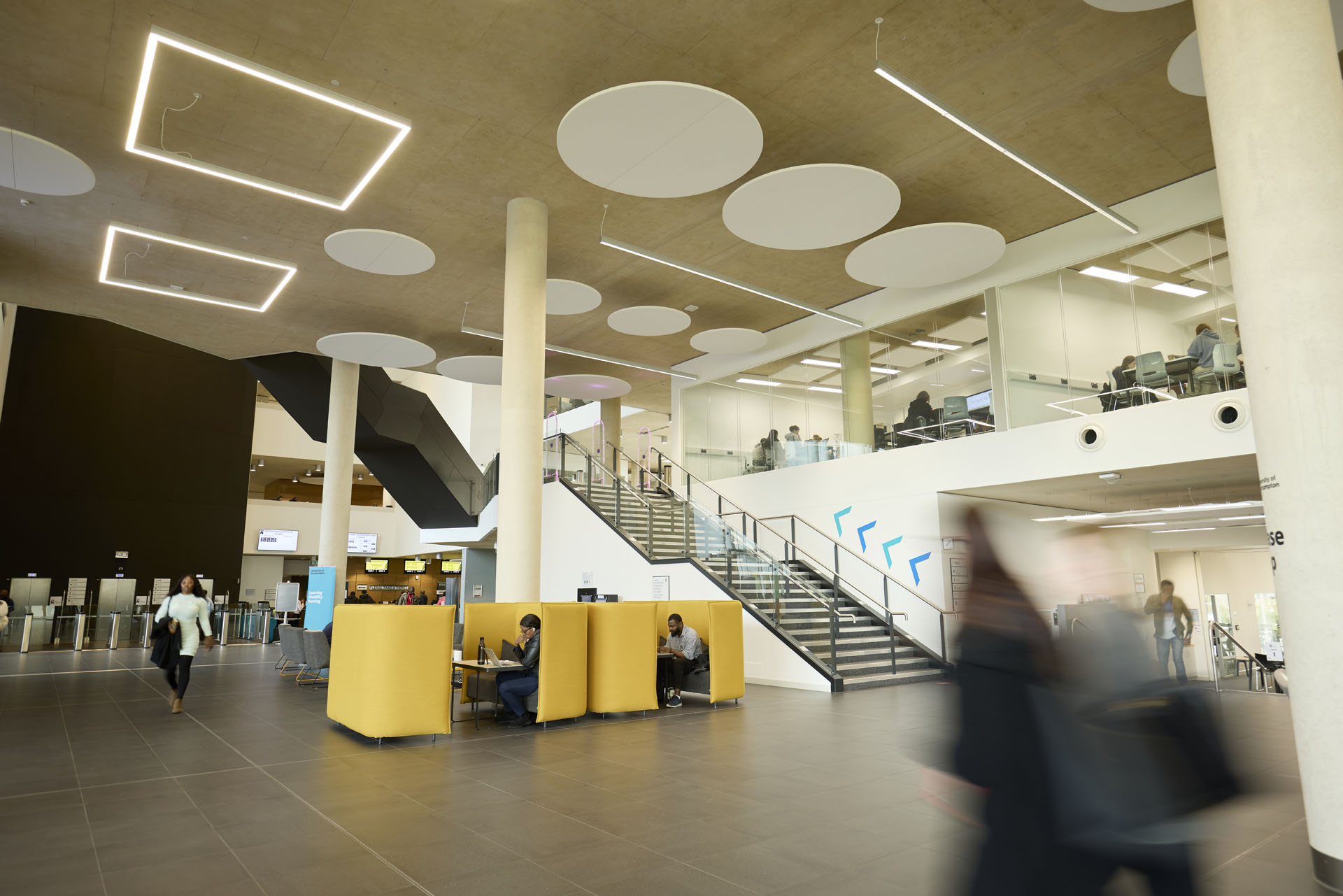
Image shows a large, modern lobby with high ceilings, circular light fixtures, and an upper floor visible. People are sitting on yellow seats and moving around. Stairs and a black staircase are also present.

Image shows external view of the Creative Hub, which is a large modern multi-story building with curved design, large windows, and white façade. In front of the building, people walk and sit on a landscaped plaza with trees and benches.

Image shows a study area on the ground floor of the Creative Hub; it has bright and modern with large windows, light fixtures on the ceiling, colourful chairs, and students seated at tables.

Image shows aerial view of the Creative Hub; a modern, curved building surrounded by greenery, paths, and people sitting or walking near a river on a partly cloudy day.

Image shows the main entrance to the Learning Hub, which is a large, multi-storied building with many large windows, with ‘Learning Hub’ in large letters on the front. It is a sunny day, and several blurred people are walking outside.
Entry Requirements
A typical offer for our BA History course would be:
- BCC at A Level or,
- DMM at BTEC/Cambridge Technical or,
- Pass (C and above) at T Level
-
We welcome applications from students with a mix of A levels and BTEC/Cambridge Technical qualifications.
For more information on how to make an application, please visit our How to Apply page.
If you are an International student and would like information on making an application, please see our How to Apply page.
-
Admission to this foundation programme is normally:
- DEE at A Level or,
- MPP at BTEC or,
- Pass (D or E) at T Level
However, we would also like to hear from you if you have professional or industry experience instead, a range of other qualifications or self-developed subject knowledge that relates to the programme you wish to study.
-
All International and EU students applying for a course with the University of Northampton must meet the following minimum English language requirements:
- IELTS 6.0 (or equivalent) with a minimum of 5.5 in all bands
for study at undergraduate level
For information regarding English language requirements at the University, please see our IELTS page.
- IELTS 6.0 (or equivalent) with a minimum of 5.5 in all bands
Upcoming Discovery Days
Discovery Days give you the best experience and insight to courses, people and facilities that interest you. Make your choice easier and come meet us.
Course Content
-
All History BA modules at UON are constructed by experts in their respective fields who produce important books and peer-reviewed journal articles, appear on TV and radio shows, write for publications such as the BBC History Magazine, and act as expert advisors to government and heritage groups.
During your History degree, they will help you develop valuable skills in communication and analysis by working with online datasets, investigating historical texts, objects and images, and engaging with arguments put forward by leading historians. The History team are a small, friendly group who care about the quality of your experience, learning journey and destination in the workplace. The lecturers are there for you if you need support and will empower you to develop into independent learners who can thrive in the workplace.
Year 1
In the first year of your History BA degree, you learn about the study of history as an academic discipline and gain the key skills you need to complete assignments. Medieval and Early Modern history are core parts of the degree, and those intrigued by the distant past can study major events and processes which occurred between the late Middle Ages and the Enlightenment. North American history is covered in depth too, enabling students to explore the rise of the USA as a global superpower. Those fascinated by Modern history can study warfare and diplomacy in nineteenth-century Europe as well as the Holocaust and its legacies, while those interested in the History of Medicine can investigate attitudes to and experiences of disease and disability from the ancient world to the early twentieth century.
Year 2
In your second year, you study topics which align with staff research interests, as well as gain opportunities to develop skills for use during your degree and after you graduate. Students study medieval chivalry, crime and the law in eighteenth- and nineteenth-century England, family relations between the Tudor and Georgian eras, the lives of the poor in eighteenth-century and nineteenth century Britain, the First World War, twentieth and twenty-first century communism, and the legacies of European imperialism. Staff provide guidance on how to prepare for final year research projects, and there are opportunities to undertake work-based learning projects.
Year 3
In your History BA final year, under the supervision of a lecturer, you spend up to a third of your time developing a research project on a topic of your choosing. As in the second year, students choose from various modules which focus on topics such as the Wars of the Roses, British military intelligence between the Elizabethan age and the Second World War, Georgian country houses, fascism and the far right, working lives of early modern women, the East End of London at the time of the Jack the Ripper murders, citizenship and gender in Victorian Britain, and attitudes to death and bereavement between the late Middle Ages and the First World War.
Teaching and Assessments to build your skills for the future
Throughout your History degree, you are encouraged to build and develop your skills for the future, and our students go on to have a wide range of interesting careers. This includes a focus on digital literacy skills, such as creating blogs, podcasts and recorded presentations, as well as working with groups, researching and writing detailed essays, working to deadlines and becoming a subject specialist in an area that interests you. In the second year, you will have the opportunity to undertake a research project for a library, archive or heritage organisation. By the end of your degree at UON, you will be prepared for the graduate job market or future study.
Experience in the workplace
During your second year of the History BA, you will have an opportunity to develop your analysis and communication skills by undertaking a work-focused research project connected to an archive, library or heritage organisation through a dedicated work-based learning module. This is designed to help you develop into a work-ready graduate, and will enable you to:
- Understand the graduate job market, and the many strengths employers see in History graduates.
- Design and manage a project to meet a specific brief.
- Report to a line manager regularly with clear updates of progress.
- Work as part of a team by overcoming problems and challenges.
- Present and showcase a project to professionals.
- Network with industry figures.
We also have links with many local and regional employers, especially those linked to the heritage sector. In recent years, our students have undertaken projects for:
- The Archives of the British Racing Drivers’ Club
- Historic England’s Heritage Schools Programme
- The Historic Archives, Northampton General Hospital
- Northamptonshire Records Office
- Museum of Leathercraft
We also work closely with the university’s Student Futures team, which has a wide range of links with local and national graduate employment opportunities and run regular events on campus for students.
Studying History in Northampton
The University of Northampton is a fantastic place to study for a BA History degree, located near the heart of a diverse, historic market town in a county which witnessed key historical events including the trial of Thomas Becket and the execution of Mary Queen of Scots.
Studying for a BA in History in Northampton involves daily physical contact with the past in the form of medieval churches, Tudor townhouses, a listed Victorian Guildhall, the National Museum of Leathercraft, and a local record office with primary sources dating from the Middle Ages to the present day.
The Searchlight Archive
The Searchlight Archive, a rich collection of materials related to twentieth-century social and political history, is housed at UON, while the civil war battle-site of Naseby and numerous country houses are within easy reach of campus. For those wishing to explore historical sites further afield, Birmingham, Coventry, Leicester and London are within easy reach by public transport.
Please note the modules shown here relate to the academic year 24/25. The modules relating to the academic year 25/26 will be available from June 2025.
-
-
Blood and Iron: Europe, 1815-1914 (20 Credits)
Module code: HIS1015Status: DesignateThe purpose of this module is to explore the Origins of the First World War and their Nineteenth-Century roots. It examines the Great Powers and their conflicts, both internal and external. Using a mixture of chronological and thematic studies, the module provides the student with an understanding of why this seminal war occurred.
-
Themes and Perspectives in History (20 Credits)
Module code: HIS1021Status: CompulsoryThe purpose of this module is to introduce History students to their discipline and to the nature of university study. It therefore gives them the knowledge, skills and experiences that will enable them to succeed in their degree. Rather than focusing on subject knowledge, the module develops understanding about the nature of the subject.
-
Health and Healers: Histories of Disease and Disability (20 Credits)
Module code: HIS1023Status: DesignateThe purpose of this module is to explore and contextualise the history of the body, health and healing and its contemporary parallels and relevance. The module will investigate how ideas about body and healing interacted with, and were embedded within, historical understandings of gender, society and culture.
-
The Medieval World, 1200 - 1500 (20 Credits)
Module code: HIS1024Status: DesignateThis module focuses on the high and late Middle Ages in global context. Taking a thematic approach, students study politics, society, culture and religion to gain an understanding of the events and cultural mindset of the period. Using historiography, primary documents and material culture students examine medieval institutions and systems, but also learn about women and men at all social levels, including marginalised groups such as queer people and immigrants who are excluded from some historical narratives.
-
United States: War & Society, 1610-2020 (20 Credits)
Module code: HIS1028Status: DesignateThe purpose of this module is to explore the history of the United States through the interaction of war and society. The student will thus gain an understanding of the interplay between conflict, ideologies, and societal development prior to, during, and after the foundation of the Republic. This will be executed in a series of segments in chronological sequence.
-
The Early Modern World, 1500-1800 (20 Credits)
Module code: HIS1029Status: DesignateThe purpose of this module is to introduce students to the key cultural, religious, economic and political developments which occurred in the sixteenth, seventeenth and eighteenth-centuries. Students will engage with ongoing historiographical debates about the early modern period and will investigate various forms of surviving textual and visual evidence.
-
The Holocaust and the Politics of Race (20 Credits)
Module code: HIS1030Status: DesignateThis module will introduce students to the main developments of the Holocaust, and will allow them to contextualise genocide in a wider historical awareness of race and politics in Europe. It will explore the ways the Holocaust unfolded in different parts of the continent, and will critically examine how forms of genocide impacted on a range of target communities. It develops a critical understanding of important historiographical debates, and source analysis skills.
-
Politics and Society in Britain since 1945 (20 Credits)
Module code: HIS1032Status: DesignateThis module will introduce students to how British politics and society developed after the end of the Second World War, and the historical debates surrounding these developments. It will explore how and why ideas and experiences of class, gender, sexuality and race altered in relation to the broader political and social changes in Britain during this period. Students will develop the ability to engage critically with important historiographical debates, and to analyse both diverse kinds of primary sources.
-
Blood and Iron: Europe, 1815-1914 (20 Credits)
-
-
Crime, Policing and Punishment in England, 1700-1900 (20 Credits)
Module code: HIS2010Status: DesignateThe purpose of this module is explore the fundamental changes that occurred in attitudes to, and policies towards crime, policing and punishment in Britain during a period of fundamental economic and social change.
-
Comrades and Revolutions! A History of the Communist Movement in Europe and Asia (20 Credits)
Module code: HIS2013Status: DesignateThe purpose of this module is to explore the ideas of Karl Marx, and examine how these influenced Communist states in Europe and Asia in the twentieth century. It will include scrutiny of Marxist ideologies, communist regimes, their political, social and cultural history, and promote a comparative approach to history.
-
First World War (20 Credits)
Module code: HIS2014Status: DesignateThe purpose of this module is to explore the First World War through the conceptual framework of Total War. It examines the military operations as well as the diplomatic, political, social and economic dimensions of the conflict. Using a mixture of chronological and thematic studies, the module provides the student with an understanding of this seminal war.
-
Dissertation Research Skills (10 Credits)
Module code: HIS2028Status: CompulsoryThe purpose of this module is to facilitate and promote students' on-going development of their professional research skills through undertaking personal development plans and skills reflections.
-
Medieval Chivalry and its Afterlives (20 Credits)
Module code: HIS2030Status: DesignateChivalry: more than just knights in shining armour jousting for the love of fair ladies. Chivalry was in fact the overarching cultural ethos of the medieval world. From the twelfth to fifteenth centuries, chivalric values profoundly shaped medieval political, literary and artistic cultures, while also influencing how people framed wider social values.
-
Shadows of Empire: Movements and Migrations (20 Credits)
Module code: HIS2035Status: DesignateThe purpose of this module is to help students understand the nature of global and international history and to build an awareness of the contours and contexts of imperialism and colonialism both in history and in the way they shape contemporary society and culture.
-
From Pleasure to Anxiety: The English Aristocracy 1750-1950 (20 Credits)
Module code: HIS2037Status: DesignateThe purpose of this module is to introduce students to the history of the landed upper classes through both historiographical and primary source material.
-
Communicating History (10 Credits)
Module code: HIS2038Status: CompulsoryThis module provides students with opportunities to develop research and analysis skills by undertaking a problem-solving project for a specific partner. Using traditional and digital media, students will be required to communicate their findings to non-historians, demonstrating transferable skills of use in various graduate-level careers and postgraduate study.
-
Crime, Policing and Punishment in England, 1700-1900 (20 Credits)
-
-
Citizenship and Gender in Britain 1760-1918 (20 Credits)
Module code: HIS3018Status: DesignateThe purpose of this module is to explore what it meant to be a citizen in a context where this question was commonly negotiated in terms of what it meant to be a man or a woman. How did Georgians, Victorians and Edwardians conceptualise the duties and attributes of the citizen, and who did they seek to exclude?
-
Secret State: British Intelligence, 1558-1945 (20 Credits)
Module code: HIS3027Status: DesignateThe purpose of this module is to explore intelligence history, specifically the contribution of the intelligence services to Britain?s security from the early modern period through to the mid-Twentieth Century. It examines foreign intelligence, military intelligence, and security intelligence in both peace and war. Using mostly chronological case studies, the module provides the student with an understanding of how and why intelligence has affected British history.
-
The English Country House, c.1660-1830 (20 Credits)
Module code: HIS3028Status: DesignateThe purpose of this module is to develop a high level of understanding of the English Country House during the long eighteenth century through historiography and primary sources.
-
Jack the Ripper's London: Crime & Popular Culture in the Late Victorian City (20 Credits)
Module code: HIS3038Status: DesignateThe purpose of this module is to explore the nature of late Victorian urban society through a number of social and cultural historical themes.
-
Murder and Mayhem: Crime in Twentieth Century Britain and America (20 Credits)
Module code: HIS3043Status: DesignateThis module will be taught through a series of case studies in order to examine specific themes which are especially pertinent to criminal justice history during the modern era. The types of issues to be addressed include the rise to `social? prominence of the serial killer and spree killer; the influence of gang culture on criminal activity; the role of the media in the portrayal of `modern? crime; the legal response to `new? forms of criminality and the debate over the use of the death penalty for violent offences. In a comparative context, students will be able to determine the similarities and differences in the nature and treatment of crime and criminals across the Atlantic during a period of `modernisation? and rapid social change.
-
Using History (20 Credits)
Module code: HIS3044Status: CompulsoryThe purpose of this module is to develop the employability of our History graduates. It uses the student?s dissertation process ? the compulsory culmination of their UG intellectual and personal developmental journey ? as a vehicle for enhancing their communication skills towards non-academic audiences. It also provides an opportunity to engage in reflection upon prior experiential learning.
-
Seeing Ghosts? Death and the Supernatural in Britain: 1654 - 1918 (20 Credits)
Module code: HIS3045Status: DesignateThe purpose of this module is to explore key themes in the cultural and social history of attitudes towards death, bereavement, magic and the supernatural in Britain, 1654-1918.
-
Dissertation (40 Credits)
Module code: HIS4001Status: CompulsoryThe purpose of this module is to enable students to select and develop a historical research question and to complete an independently researched project culminating in a 10,000 word dissertation.
-
Citizenship and Gender in Britain 1760-1918 (20 Credits)
-
At the University of Northampton, everything we do, from funded trips to paid internships, is to give you everything you need to make a difference when you leave.
If you join this full time History degree at Northampton, you will receive a laptop when your course begins*. The laptops are built to a bespoke custom specification ideal for use in the seminar room, collaborative group work or studying at home.
Whatever your ambitions, we’re here to help you to achieve them. We’ll support you to identify the skills you’re learning during your History course, find your strengths and secure practical experience so that when it comes to applying for jobs or further study you’ll feel confident in standing out from the crowd. We’ve created the Northampton Employment Promise because we are so confident that if you focus on your studies and complete one of our awards you’ll be highly employable by the time you graduate. Putting you in a great position to secure employment or continue your studies.
To check out the full list of perks, visit our Student Perks page or dedicated International Perks page.
*UK fee payers only (see Terms and Conditions for further details). For more information about possible funding options, please visit our Fees and Funding pages.
-
The Integrated Foundation Year (IFY) offers a new and exciting route into studying for a History degree, attracting ambitious and driven students who are willing to learn and advance.
If you have non-standard qualifications or do not quite meet the admissions requirements we can offer you a fantastic opportunity to study a four year programme which includes an Integrated Foundation Year. The Integrated Foundation Year will help you develop the theoretical/practical and academic skills you need, in order to successfully progress to the full award.
Our four-year courses will enable you to successfully follow the degree pathway of your choice while gaining essential study skills. The foundation year of your chosen degree will be studied on a full-time basis and is aimed at supporting the transition to higher education. Years two, three and four are then studied as a standard degree programme.
-
How will I be taught throughout the History degree?
During your studies, you will have regular opportunities to discuss theories about the past and examine historical evidence. Most modules are taught in weekly four-hour blocks which allow time to explore complex topics in significant depth, as well as to ask questions of the experts who lead classes.
Typical debates you engage with include whether there was a Scientific Revolution in the seventeenth century, did the law discriminate against women in the eighteenth century, what were the causes of the First World War, and how should western societies respond to calls for reparations from former colonies?
To answer these sorts of questions throughout your BA in History, you’ll examine autobiographies, diaries, letters, conduct manuals, newspapers, portraits, charters, pamphlets, legal and medical records, and objects such as eighteenth-century shoes, in the classroom and during field-trips, but also read, discuss and engage in constructive dialogue with the arguments of other historians.
How many hours per week of teaching/ personal tutoring?
In the first and second years (levels 4-5) a third of your time (12 hours per week) will be spent in class, allowing you regular face-to-face contact with lecturers so that you can explore ideas and ask questions.
These contact hours are supplemented by 24 hours of independent study, and there are opportunities to meet regularly with your personal tutor if you need academic and pastoral support. Modules last for one semester, and students take 60 credits (usually three modules) in each.
In the third year (level 6), you spend 8 hours per week in class (two modules per semester) to allow you time to work on your research project, but there are opportunities to take one-to-one tutorials with lecturers too, and you retain the support of your personal tutor.
How will I be assessed on the History BA degree?
Assessments on this History degree enable students to display their knowledge of historical processes and events, and to demonstrate how they can use evidence to communicate their ideas about the past. Short essays are a key form of assessment, but students also communicate what they have learned through blogs, posters and podcasts.
History lecturers at UON want students to treat assessments as exciting opportunities to display their knowledge and offer guidance on how to structure and what to include in assignments, as well as extensive feedback once work has been completed.
Worried about student finance?
Get all the info you need ahead of time, before you can apply for funding in Spring on our fees and funding pages.
Fees and Funding
2025/26 Tuition Fees
- UK – Full Time: £9,535
- UK – Part Time: £1,585 per 20 credit module
- UK – Integrated Foundation Year: £5,760
- International – Full Time: £15,700
- International – Integrated Foundation Year: £15,700
Fees quoted relate to study in the Academic Year 2025/26 only and may be subject to inflationary increases in future years. UON will adjust UK fees annually in line with Government Policy.
-
Those studying BA History at the University of Northampton will have opportunities to join a range of fascinating study trips, which in recent years have included a Jack the Ripper tour in the East End of London, as well as visits to the Imperial War Museum and Bletchley Park. These trips are optional and typically you will only be asked to pay for your travel, with costs varying depending on where you book them from.
-
For information on the scholarships available to you, please see our scholarships page.
For more information about possible funding options, please visit our Fees and Funding pages.
-
Fees quoted relate to study BA History in the Academic Year 24/25 only and may be subject to inflationary increases in future years.
- UK – Full Time: £9,250
- UK – Part Time: £1,540 per 20 credit module
- UK – Integrated Foundation Year: £9,250
- International – Full Time: £15,200
- International – Integrated Foundation Year: £15,200

Related Courses

Politics and International Relations BA (Hons)
This course provides you with an excellent grounding for careers across the public, private and voluntary...

Sociology BA (Hons)
Our Sociology course allows you to develop your understanding of how humans shape and are shaped...
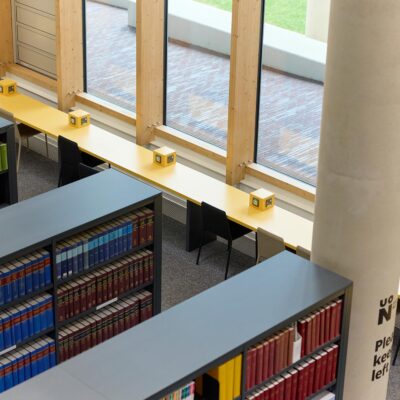
History MA
This master's course is designed for those who wish to develop their knowledge and understanding of...

English BA (Hons)
This dynamic and diverse BA English course provides a thorough exploration of English Literature from the...







